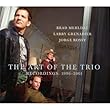
After considerable thought, and the help of family, friends, and well meaning ministers, I have decided against voting in the upcoming election. In fact, I will not vote in any election of any kind. It isn't just that my vote really does not matter, or that voting perpetuates the illusion that I have a hand in democracy, but that I value my salvation.
You see, Mr.
Dennis Marcellino stated recently, "The Bible does say that if a person votes for a democrat (the promoters and supporters of sin) and were to die without repenting of that, he or she is going to hell.". He quotes Paul's second letter to the Thessalonians: "Then everyone who did not believe the truth, but was delighted with what God disapproves of, will be condemned" (verse 12). This is from, by the way, the GOD'S WORD Translation. I prefer the English Standard, and hope the "reverend" Marcellino will permit me: "in order that all may be condemned who did not believe the truth but had pleasure in unrighteousness." Gee, I hope the "minister" won't condemn me for reading a different translation. I do hope we can agree that the two versions say essentially the same thing, that one who approves of the sin of someone else, even in his or her thoughts, will go to eternal perdition for doing so.
For now, I do not want to quibble over the loving minister's theology or his stance (after all, he states that he does not want to be "inflammatory" or "emotional"). I am going to take him at his simple word. He has a simple argument.

- Certain actions are sin. These actions include abortion and homosexuality.
- Approval of what God disapproves of (such as sin) brings about condemnation from God.
- Voting for a person who approves of what God disapproves of is the same thing as approving those sins and thus will bring about condemnation.
Let us assume all three points are, as Mr. Marcellino says, fact. If so, voting for any Democrat will cause me to go to hell. I cannot even vote for a Democrat who is pro-life and against gay marriage because by being in the group with other Democrats, he essentially approves of what he does not approve of and thus voting for him will also send me to lasting flames.
Now, the kind "minister" does not explicitly say that if I vote for a Republican, I will avoid this fate. I think he kind of implies it. But he does say, "one way that a person expresses that delight is: how they vote … especially if it’s for a candidate who supports gay marriage or any other sin" (emphasis mine).
Uh oh.
While Republicans do not, in general, support gay marriage or abortion, they do seem to support other things that displease God, at least if the Bible is to be believed. For example, Jesus famously said, “No one can serve two masters, for either he will hate the one and love the other, or he will be devoted to the one and despise the other. You cannot serve God and money" (Matthew 6:24). Lots of Conservatives say they are for moral values, but their actions demonstrate that money is much more important to them. In fact, in Proverbs we find "Open your mouth, judge righteously, defend the rights of the poor and needy" (31:9). Now one can easily be a good businessman (businesswomen are not allowed by many conservatives unless they are the governor of Alaska), and still defend the causes of the poor. But most of what I hear from Republicans seems to make all the poor and needy out to be vile criminals.
So supporting someone who reviles and ignores the poor would be "delighting" in that person and "approving" of their sin. So I can't vote for that person either.

(Don't get me started on "Third Party" candidates. I've been convinced by my family and friends that voting for any of them is a waste of time even if I am voting for the person I think it best suited for the job. So we don't even get to make that a spiritual matter.)
Come to think of it, I cannot vote for anyone without risking the wrath of God because as the writer of Romans (quoting Psalm 53:3 ) states, "All have turned aside; together they have become worthless; no one does good, not even one" (3:12). Since everyone has sinned or supports some sin or has otherwise displeased God, I cannot delight in voting because that would mean to approve of someone, even if I don't approve of what it is that that person does or says or thinks that displeases God.
Gee, I hope my friends and family, don't find out about this. Because it seems to me anyone who talks to me or does something nice for me or says something supportive of me, a person who has certainly displeased God on occasion, will be in danger. And I don't want anyone go to Hell for loving me.


















